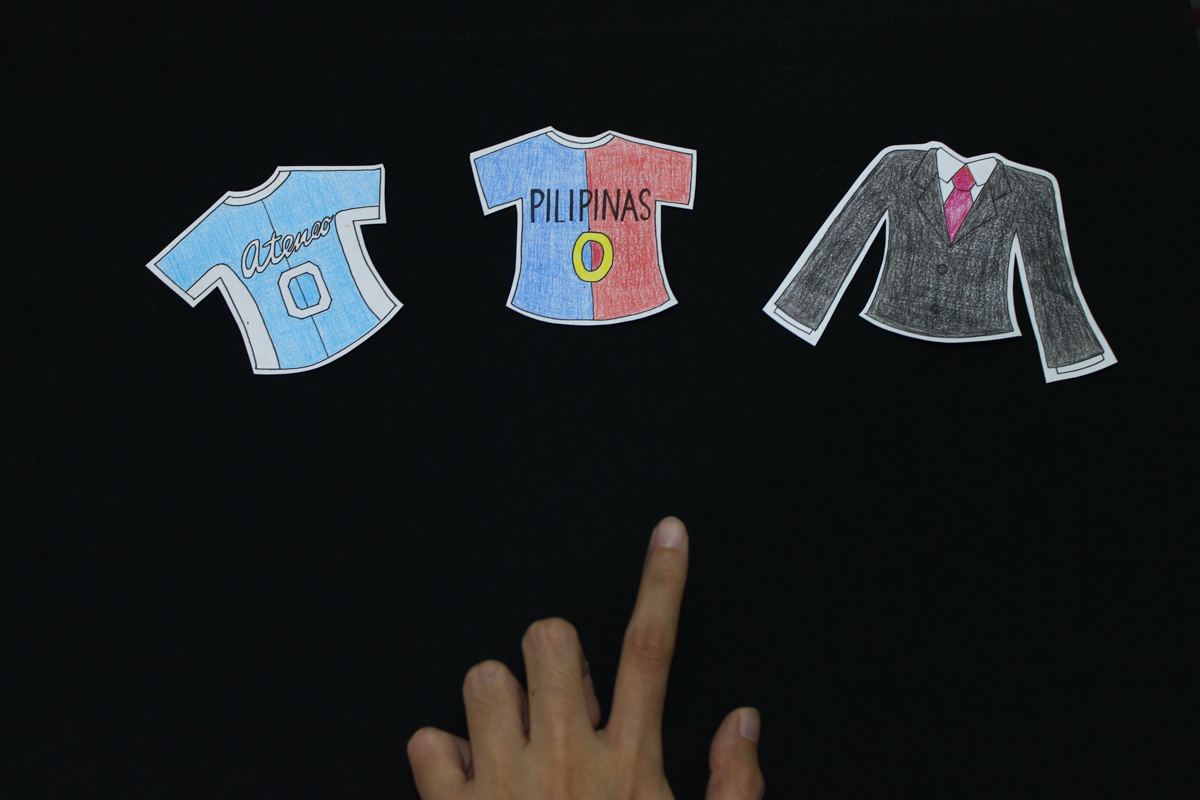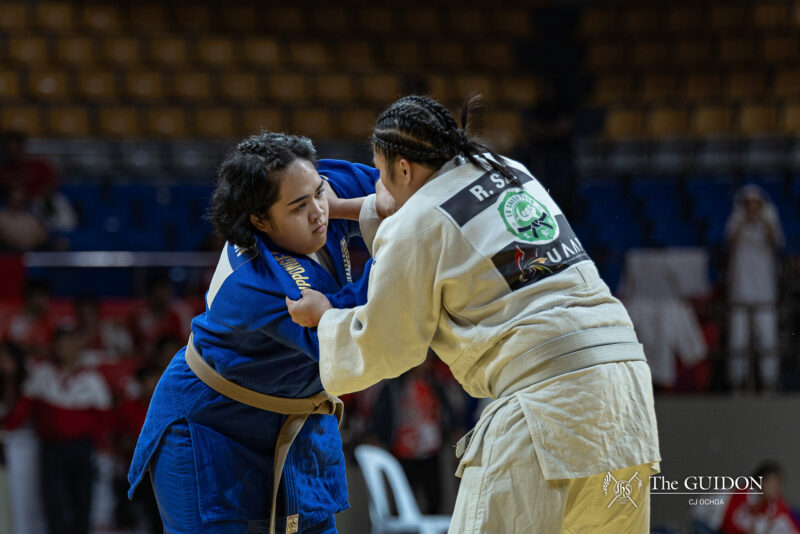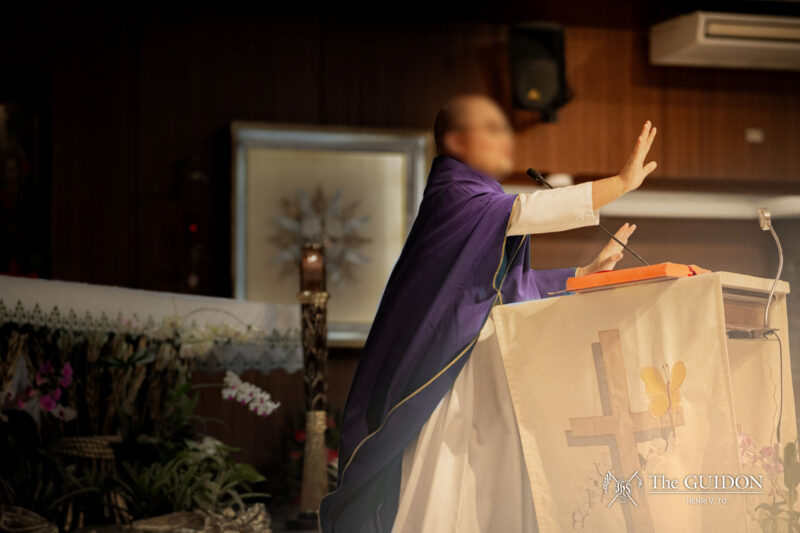FOR MANY of the country’s top athletes, the opportunity to take part in the University Athletic Association of the Philippines (UAAP) represents one of their best chances to play at their sport’s highest level. For baseball players however, this time also represents their last chance as well. For some of the nation’s brightest stars on the baseball field–a group that includes Blue Eagles Dio Remollo and Johnny Altomonte–the significant lack of professional avenues after their college stint often means that the time will come when these athletes will have to hang up their cleats, take off their hats, and call it a day.
The two superseniors’ last term of service for the Blue and White expired in the second game of the Season 78 finals, during the blue batters’ fourth consecutive finals appearance that happened against rivals De La Salle University (DLSU). The Taft-based squad secured their first championship to end a thirteen-year trophy drought, ending the Blue Eagles’ three-year championship run. The loss marked the end of Remollo and Altomonte’s careers on a less than ideal note, with the crown ultimately eluding their grasp after a two-game sweep.
Although the moral of this athletic tale may seem to be about converting regret over the loss into hunger for victory wherever baseball takes them next, the sad truth is that very few in this game have the chance to do so. With the spotlight of sports casting a dim glow over the diamond in a nation where hoops and goals are king, little opportunities exist for such athletes to make a living from their passion and prowess on the baseball field, putting an anti-climactic end to many athletic careers.
A grassroots movement
Despite being among the oldest sports in the Philippines, baseball has long been under the shadows of basketball and football, with considerably less public support and attention as compared to the country’s most popular games. Although the sport has been bannered by several milestones–including a gold medal at the first Asian Baseball Championship in 1954, as well as a visit by legends Babe Ruth and Lou Gehrig–baseball has still failed to garner similar amounts of nationwide interest, culminating in the severe lack of professional leagues and franchises.
While local basketball and football have been represented by the Philippine Basketball Association (PBA) and the United Football League (UFL), respectively, baseball still lacks a serious league to nurture the fire of competition on the local diamond. Apart from the Titans Baseball Club and the short-lived Baseball Philippines–a 2007 start-up that nearly gained an identity as the country’s major league–the absence of an athletic association capable of harnessing the Philippines’ potential as a baseball powerhouse hinders the sport’s growth, forcing players either to call it quits or to seek their fortune on the diamond on foreign ground.
Without an elite-level athletic competition to utilize existing Philippine talent, organized baseball in the country has been mainly fueled at the grassroots through local little leagues such as the Muntinlupa Little League (MLL) and the International Little League Association of Manila (ILLAM), as well as inter-school friendly competitions.
But the biggest league that the Philippines has to offer to keep baseball in the public’s consciousness continues to be the UAAP, which in 1938 included baseball into its initial list of sports. The tournament was where the University of Santo Tomas reigned supreme in the league’s earlier seasons, with the Ateneo but a mere afterthought.
According to Atty. Kristian Ablan, a former pitcher and outfielder for the Blue Eagles whose stint as a batter ended in Season 61, there was a period where Ateneo baseball sat in the slumps, with little notice and funding given to the poorly-performing varsity team.
“We were cellar dwellers back then,” he admits. “Baseball was not popular during my time. No one would watch our games. The Blue Babble Battalion would not play and not much attention was given to us by the university compared to other sports.”
However, spells of losses, disinterest, and equipment shortages were coming to an end. The Blue Eagles’ period of obscurity would pass a few years later when a skillful batch of experienced recruits eventually donned the Blue and White, making a name for the university on the UAAP diamond while simultaneously giving rise to a new age in college baseball.
A new breed of blue
Season 73 marked the debut of perhaps the greatest class of rookies to wear the Blue and White on the baseball field—a group of top high school recruits that included Adriane Bernardo, Matt Laurel, Pelos Remollo, Chip Esguerra, and Andy Tan. The quintet led the Blue Eagles to a fourth-place finish in their first playing year, and then carried the team to a much-deserved finals appearance against the National University in their next; the school’s first attempt at a championship in its entire history was one of the first signs of change in the university’s athletic outlook on baseball.
With the blue batters capturing the gold against DLSU in a historic run spanning from Season 75 to 77, interest in baseball began to pick up significantly compared to previous years, evidenced by television coverage and greater college recruitment through the awarding of more scholarships.
Attendance and interest in playing soon expanded as college teams intensified their caliber in response to a swelling desire for championship gold in the UAAP. “During my first couple of playing years, most of the people who would watch our games were parents and close friends,” shares Andy Tan, a twice-awarded Most Valuable Player. “To be honest, baseball didn’t attract the biggest of crowds and wasn’t exactly that popular, but when we started to play La Salle in the finals, the crowd started to grow.”
Although school competition in baseball is currently at an all-time high, the question remains regarding how it can expand and improve on its most crucial aspects—attention and exposure—to give many homegrown players the professional opportunities that they deserve.
Ablan emphasizes the necessity of media coverage to ensure that fans and players alike can appreciate the game. “The Philippine Sports Commission should step up its support for the sport,” he claims. “Even if team sports are expensive, they promote teamwork, which is an important feature in national development.”
A rare opportunity was presented to Bernardo after he graduated last school year, when he was offered a coaching job on the collegiate team by Ateneo Baseball Program Head Randy Dizer. This gave Bernardo a chance to put his 17 years of baseball experience to good use, promoting the sport from the sidelines—now, as a coach.
In addition, Bernardo has also been coaching at the high school level as one of the mentors for the softball team of Saint Pedro Poveda College. “Sayang yung pinaghirapan ko for 17 years (My effort for 17 years would have been a waste),” he says. “So why, after college, stop?”
However, Bernardo’s situation is more of the exception than the norm. Tan, arguably one of the most talented pitchers ever produced by the UAAP, is a testament to the sad truth of Philippine baseball. Nowadays, Tan still makes a living through athletics, but in the realm of football, playing in the second division of the UFL. The former pitcher admits that the prospect of playing baseball professionally in the present seems bleak; playing for the national team and competing abroad are possibly the farthest that one can go in the sport. He does, however, express hope that the situation will change for athletes who have honed a passion for life on the diamond.
“There isn’t a professional league in the country to try your luck in, and the national team hasn’t been as active as people would want,” Tan laments. “It’s sad because there is a lot of talent in the Philippines, and I hope the situation for the sport changes in the near future.”








This is a very good read and quite sad on the state of baseball in the Philippines, I believe the errors of the past still have its mark on it – the 1992 Little League Series where the Blue Boys won but discovered or exposed to have cheated in the acquisition and completion of its roster.
Media really has a way of either promoting or completely destroying a sport there in the Philippines, unfortunately they also favour only sports that generate viewers and money which is ugly. TV Media shouldn’t really just focus on famous sports like basketball and football.
Not to mention the facilities – there are more spaces for basketball than any other field sports. I know basketball is a really “cheap” perhaps even football just grab a ball then either kick or shoot in a make shift goal or hoop. But come on – baseball requires more players than that basketball in the field and each position is unique.
Anyway, I hope these experienced and professional baseball players would raise their concern to the newly appointed president – we all know he is a busy man upholding and keeping his vows of wiping our criminality and illegal drug trades but he also needs to keep an eye on creating programs for the youth, job creation and what not – economic stability / security. If there is a sport that creates as much jobs as basketball & football – its baseball. If basketball needs 2-3 refs – baseball needs 4, field maintenance look no further like the Japanese in their stadium has at least 5-8 to maintain the field.